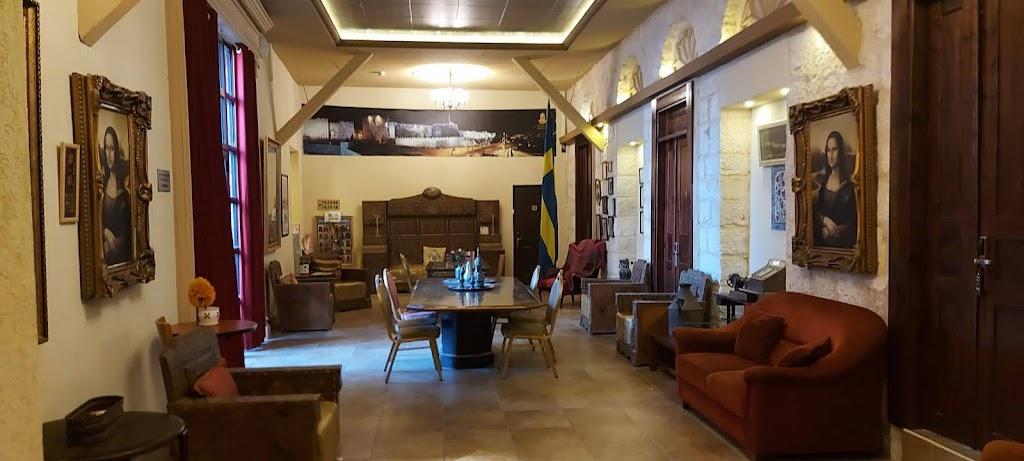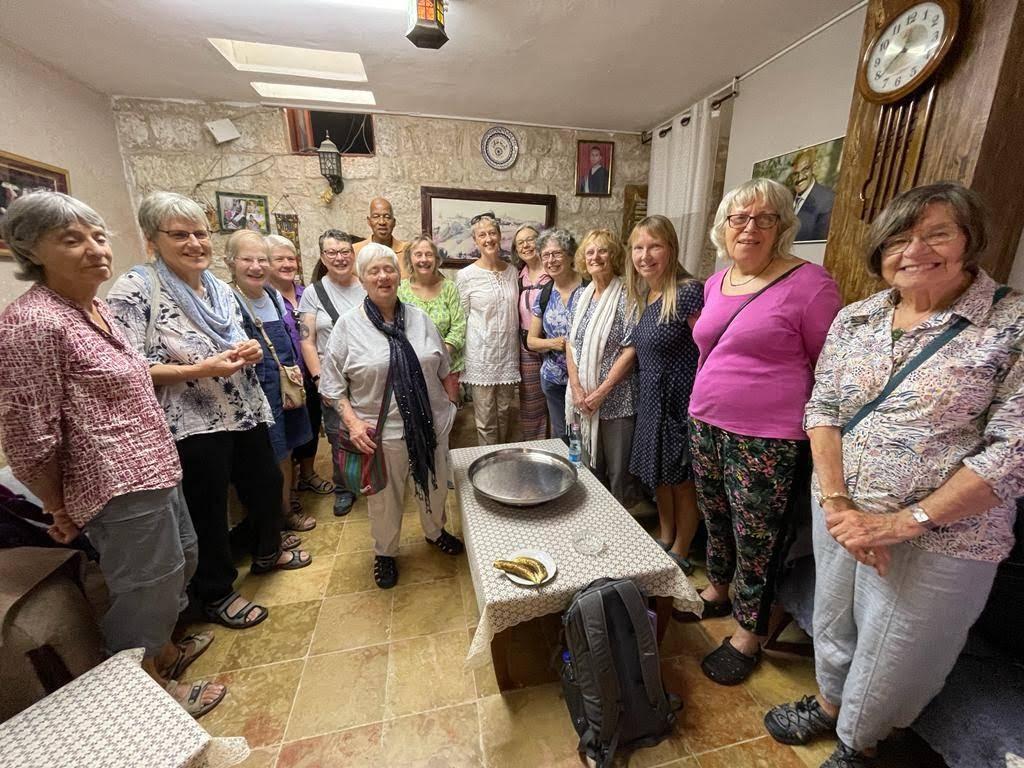We thought we knew the power of singing. But in the moments after our Hebron guide, Human Rights Defender Issa Amro, had been confronted by sneering settlers and immovable soldiers, and had eventually decided to lead us back down the Palestinian right of way that they were blocking, we broke into song – Only Justice and Equality Can Bring Peace, and Justice for Palestine – and finally understood just how potent singing could be. It lifted our spirits and turned our anger and frustration into determination. With heads held high, we sang our way through the checkpoint. “Keep singing, keep singing,” urged Issa, joining in as he filmed us. Later, we sang at the gated entrance to Shuhada Street, closed off to Palestinians since 1994, and, more relaxed, outside a coffee shop, to the delight of customers and passers by, phones recording. This group of British women were singing and everyone wanted to hear.
We sang This Is Home, by Sophia Efthimiou, in Arabic and English, in a house in the African quarter of Jerusalem belonging to our guide Mahmoud, who had been brought to Palestine as a baby from Chad but is officially stateless, and then again to Tamer, another of our wonderful guides, in the graveyard of a destroyed village near Nazareth where his grandfather had lived (see video). Dreams of Home, again with both Arabic and English lyrics, was inspired by a project at Aida Refugee Camp in Bethlehem in which children had the chance to visit the villages which their grandparents had been forced to leave, bringing back stones, a little soil, an olive branch; we sang the song in a concert at the Lajee Centre where the project was born.
People were delighted when we included in our repertoire songs that they knew, and happily sang along with the Egyptian love song Zourouni, known throughout the Arab world, and Baktub Ismik Ya B’ladi, a song about love for their country, including an impromptu rendition in a taxi when the song came on the radio – the driver turned it up to full volume as we sang along.
Kathy Bullock’s All Around My Spirit was chosen for its slightly altered line, “I will rock my heart ‘til the wall comes down,” and we performed it in the shadow of the infamous apartheid wall.
We sang on two occasions in Banksy’s famous Walled Off Hotel, once when we were advised not to go back to our accommodation at the refugee camp because of trouble at the gates and once when the band we’d gone to see invited us to the stage.
Sometimes we sang for ourselves. Bridget Cousins’ Cry Heart, But Do Not Break helped us through the times when we’d heard dreadful news of attacks in Nablus or battles involving tear gas or worse. Learning Eleanor Hill’s Olive Tree round was calming and grounding, as was the physical act of harvesting olives as we sang. Many times we sang through shared tears, supporting each other.
We used songs and singing games to connect with children of all ages in Aida Refugee Camp and in Sebastia. Children would later come up to us in the street and sing a snatch of one of our songs to us. Young people who came along to entertain us on our last evening in Sebastia were genuinely surprised when this group of admittedly weary women stood up and gave it their all. We sang to older people too – a group of women in Nazareth who work hard to keep their culture alive in Israel shared songs, traditional crafts and their love of their city. And Ma’a Salaama, our “goodbye and thank you” song, was sung frequently to bid farewell.
We’d formed the choir to show solidarity (our name, Tadhamon, means solidarity in Arabic) and show it we did. I Stand With You was well received whenever we performed it and we were very proud to have our young friend Dalya, a Sheffield Palestine Women’s Scholarship Fund student, rapping over a section of it at Dheisheh Refugee Camp in Bethlehem. Singing from our hearts to the hearts of the Palestinian people transcended cultural and language differences; it will enable us, going forward, to share not only our experience but the heartless oppression of the Israeli government and the dignified steadfastness and resistance of the people of Palestine.
I will learn to share your song
I’ll cheer you on as I see you rise
I’ll sing your pain upon the wind for all to know
I stand with you, I stand with you
Your fight is my fight too
I stand with you.


